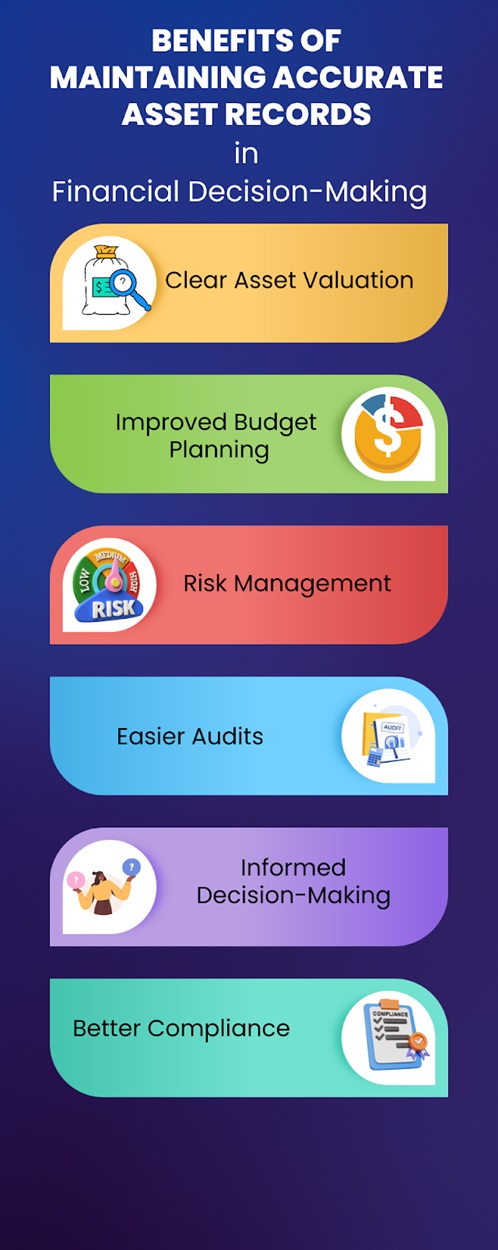How Accurate Asset Records Benefit Financial Decision-Making
Are you confident that your financial decisions are based on reliable data? If not, you are missing out on valuable insights that accurate asset records provide. Accurate asset records are not just numbers on a spreadsheet—they're the backbone of informed decision-making.
Whether you're managing corporate assets or overseeing financial operations, the precision of your asset records can make or break your strategies. Let’s explore how maintaining precise asset records can significantly boost your financial decision-making process.
Why are Accurate Asset Records Needed for Financial Decision-Making?
Accurate records about assets are important to businesses because they provide a clear view of their assets, manage risks effectively, allocate resources based on prevailing distributions, and plan budgets effectively. Precise information allows companies to make informed choices, avoid costly mistakes, optimize ROI, and comply with financial regulations, achieving long-term financial stability.
The Link Between Asset Records and Financial Reporting
Imagine trying to navigate a ship knowing its exact position or the condition of its equipment. That's what financial leaders face when dealing with inaccurate asset records. Such anomalies can result in costly errors while reporting financials, and may even lead to:
- Misinformed investment decisions,
- Incorrect budget allocations, and
- Compliance issues with financial regulations.
That’s why having precise, up-to-date information is so important. With the help of Fixed asset management software, you can easily track your assets, reduce the risk of financial errors, and ensure your reports are spot on. This not only helps with day-to-day financial health but also ensures you stay compliant with regulations, avoiding unnecessary headaches.
Enhancing Risk Management Through Precise Asset Tracking
Accurate asset records do more than just keep your books in order. They act as effective tools to mitigate financial risks. Here's how:
- Transparency: Tracking the condition of physical assets, schedule of maintenance, and replacement times allows for more effective financial planning.
- Anticipation: Based on accurate information, companies can anticipate any financial exposure because of loss, underutilization, or an unexpected break or downtime of assets.
- Agility: Real-time asset information enables quicker responses to changing market conditions or unexpected events.
Maintaining updated asset records enables a business to prepare a more robust risk management strategy. This step can protect a business from potential losses and also helps open up avenues for strategic growth and investments.
Improved Budgeting and Forecasting with Real-Time Asset Data
Accurate and real-time asset information is the secret ingredient to producing reliable budgets and forecasts. Finance teams with timely access to current asset values and depreciation rates can:
- Allocate resources more efficiently
- Make informed decisions about capital expenditures
- Align budgets more closely with strategic financial goals
Firms that maintain precise asset records align their capital expenditures with strategic financial goals. This alignment is important for long-term success and sustainable growth.
Asset management software plays a vital role in this process. Real-time updates and the right information on the assets enable the finance team to present budgets and forecasts that truly reflect the financial situation of the company.
Optimizing Return on Investment (ROI) with Accurate Asset Management
Every business aims to maximize its return on investment. Here's why:
- Informed Decisions: When you know exactly what assets you have, their condition, and their utilization rates, you can make smarter investment choices.
- Performance tracking: Accurate records will help track the performance of every asset to ensure that every dollar invested yields measurable returns.
- Resource Allocation: You can use the asset landscape to plan and allocate resources appropriately, focusing on places with the highest returns.
Companies with accurate asset tracking can improve profitability since this is achieved through improved resource utilization and elimination of waste.
Streamlining Decision-Making with Integrated Asset Management Systems
Today’s businesses require fast information and fast decisions. Integrated asset management systems provide a unified consolidation for decision-makers by:
- Ensuring centralization of asset data
- Allowing easy integration with financial planning software
- Providing real-time updates on asset status and performance
This integration automatically quickens decision-making by eliminating the time and effort required to access accurate, up-to-date asset records. Financial leaders can quickly make confident decisions with all information in one place.

The Role of Asset Management Software in Automating Accuracy
The key to maintaining accurate asset records lies in automation. Software like Intune Asset Management Software plays a major role in this process by:
Automating Data Collection and Updates
Unlike physical input, which can lead to human error and outdated input, an automated system continuously collects and updates data from multiple touchpoints of the assets. For example, when a company buys a new piece of equipment, the system automatically inducts the same into the database, gives it an ID, and tracks its usage and depreciation over time without any human interaction.
Reducing Human Error in Record-keeping
Human-based tracking, which depends on manual entry and communication, is bound to contain errors owing to mistakes in entering data or incorrect communication. Automation removes such possibilities as it allows for reliable updates on asset records. For instance, if one asset is being transferred from one department to another, the system automatically prevents any oversight that could occur with manual processes.
Providing Real-time Visibility into Asset Status and Location
Automation can provide immediate access to asset status information, location, and schedules for maintenance check-ups, ensuring all decisions are made through the most accurate information available at the point in time.
Conclusion: The Power of Precision in Financial Decision-Making
Accurate asset records are not just a matter of good bookkeeping—they're a powerful tool for driving financial success. They improve risk management and budgeting, optimize ROI, and streamline decision making among other things of financial strategy.
By investing in robust asset management systems and prioritizing data accuracy, businesses can create a solid foundation for informed financial decision-making. This level of precision can be the difference between merely surviving and thriving in this competitive economy.
Are you ready to harness the power of accurate asset records for your financial decision-making? Consider exploring asset management solutions that can help you achieve this level of precision and confidence in your financial strategies.
Frequently Asked Questions (FAQs)
- How does accurate asset tracking impact financial audits?
Accurate asset tracking makes financial audits easier by keeping data up-to-date and verifiable. It helps provide auditors with the right information quickly, reducing the chances of mistakes, penalties, or delays and ensures compliance with regulations.
- Can asset management software improve ROI?
Yes, asset management software boosts the return on investment by giving insights into asset performance and usage. This helps businesses do even better at resource use, eliminate unnecessary costs, and get the most value out of their investments.
- How do accurate asset records help in budgeting and forecasting?
Accurate records provide real-time information regarding the value of all assets and usage, allowing the business to build more accurate budgets and forecasts. This minimizes the likelihood of unexpected costs and enables financial planning to become more reliable and aligned with long-term objectives.

